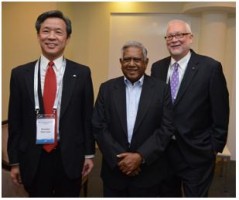Widgetized Section
Go to Admin » Appearance » Widgets » and move Gabfire Widget: Social into that MastheadOverlay zone
2013 Lien Conference Highlighted China’s Successful Governments
By Wenxuan Yu, Yu Meng and Liang Ma
The 2013 Lien Conference, held in Singapore November 15-16, offered a unique opportunity to review and discuss public administration in Asia. The conference was sponsored by Nanyang Technological University in Singapore (NCPA) and School of International and Public Affairs at Shanghai Jiao Tong University in China (SIPA). ASPA’s section on Chinese public administration served as a co-sponsor. More than 100 academics and public administration practitioners from 18 countries and regions attended the conference.
During the conference, results of the 2013 Lien Chinese Service-oriented Government Survey were announced. A key tracking mechanism of government in China, the Government Survey ranks the Top 10 Service-oriented governments in China. The research team defined “Service-Oriented Government” in the context of China as “a government that is honest, effective, open and transparent, encourages citizen participation, creates a friendly environment for sustainable development, provides quality public goods and service, and enjoys a high level of public trust and support.” Among the results for 2013 were Qingdao, Hangzhou, Xiamen, Beijing, Chengdu, Jinan, Dalian, Nanjing and Ningbo, which tied for 8th place, and Shanghai and Urumqi which tied for 10th place. Since 2010, this annual research project has been carried out by NCPA and SIPA. The Lien Foundation sponsors the survey.
Public administration in China has undergone significant transformation in the last decade, researchers revealed. The Chinese government has begun to focus more on providing quality public services and improving the quality of life of people, instead of fast and unbalanced economic growth. Building a service-oriented government has become a central theme of ongoing administration reforms in China.
NCPA, with funding from the Lien Foundation, established the Lien Chinese Public Service Research Program. It is led by Dr. Wei Wu and the incumbent chair of SIPA, Dr. Wenxuan Yu. A research team has begun to develop a scientific and comprehensive assessment scheme to evaluate the progress of building service-oriented government in urban China.
Accordingly, NCPA developed the Lien Chinese Service-Oriented Government Index. This index consists of three general dimensions:
- Citizen Perspective: solicits citizens’ opinions on nine essential public services such as public education, public healthcare, housing, social security, public safety, infrastructure, recreation and sports facilities, environmental protection, and public transportation, government efficacy, government transparency, citizen participation and political trust.
- Business Perspective: assesses government performance in the areas of business environment, essential public services, government efficacy and business participation from businesses’ perspective.
- General Public Service: evaluates government public service performance based on hard data collected from individual city statistics yearbook.
The whole evaluation scheme includes a total of 74 indicators. In the consecutive three years (2011-2013), NCPA and SIPA administrated large-scale telephone surveys of randomly selected urban residents and businesses in 36 major Chinese cities according to the Lien index.
The findings show that while the Chinese government heavily invested in public service delivery and improved its governance capacity within the past 10 years, some basic public service areas still fell short in citizens’ and businesses’ expectations. These areas included:
- housing and living cost
- employment service
- environmental protection
- financing
- innovation
- business participation
- information service
- government effectiveness from the business perspective
- government information disclosure and public participation from the citizen perspective
In addition, findings indicate that service-oriented government building measured in public service provision, public participation, information transparency, government efficacy, and government trust does not have any significant and positive linear relationship with the level of a city’s economic development or fiscal capacity.
Among those in attendance at the conference was S. R. Nathan, former president of the Republic of Singapore. Other attendees included:
- Stephen Condrey, ASPA President.
- Kuotsai Tom Liou, ASPA Immediate Past President.
- Jack Knott, University of Southern California Sol Price School of Public Policy.
- David Birdsell, Baruch College School of Public Affairs.
Also presenting at the conference were Maryantonett Flumian, president of the Institute on Governance Canada, Andrew Podger, former president of the Institute of Public Administration Australia and Yong-duck Jung, president of the Korean Association for Public Administration (KAPA).
Supported by the Lien Foundation’s endowment fund, the Lien Chinese Public Service Research Program aims to fine-tune and improve the validity and reliability of the Lien index and its survey. Researchers will work closely with ASPA and SCPA. The research program is also seeking collaboration with interested international organizations and scholars. Not only is the longitudinal nature of the Lien survey data of great use for scholarly studies on a variety of important public administration issues, but also is instrumental for Chinese government to carry out public administration reform and to improve governance capacity and public service delivery.
Wenxuan Yu is an assistant professor of public administration in the school of humanities and social sciences at Nanyang Technological University, Singapore. He can be reached at [email protected].
Meng Yu received her PhD in the School of Public Policy at Georgia Institute of Technology and is currently a post-doctoral fellow at Nanyang Technological University.
Liang Ma received his PhD in the School of Public Policy and Administration at Xi’an Jiao Tong University, China and is currently a research fellow in the Nanyang Centre for Public Administration at Nanyang Technological University.



Follow Us!